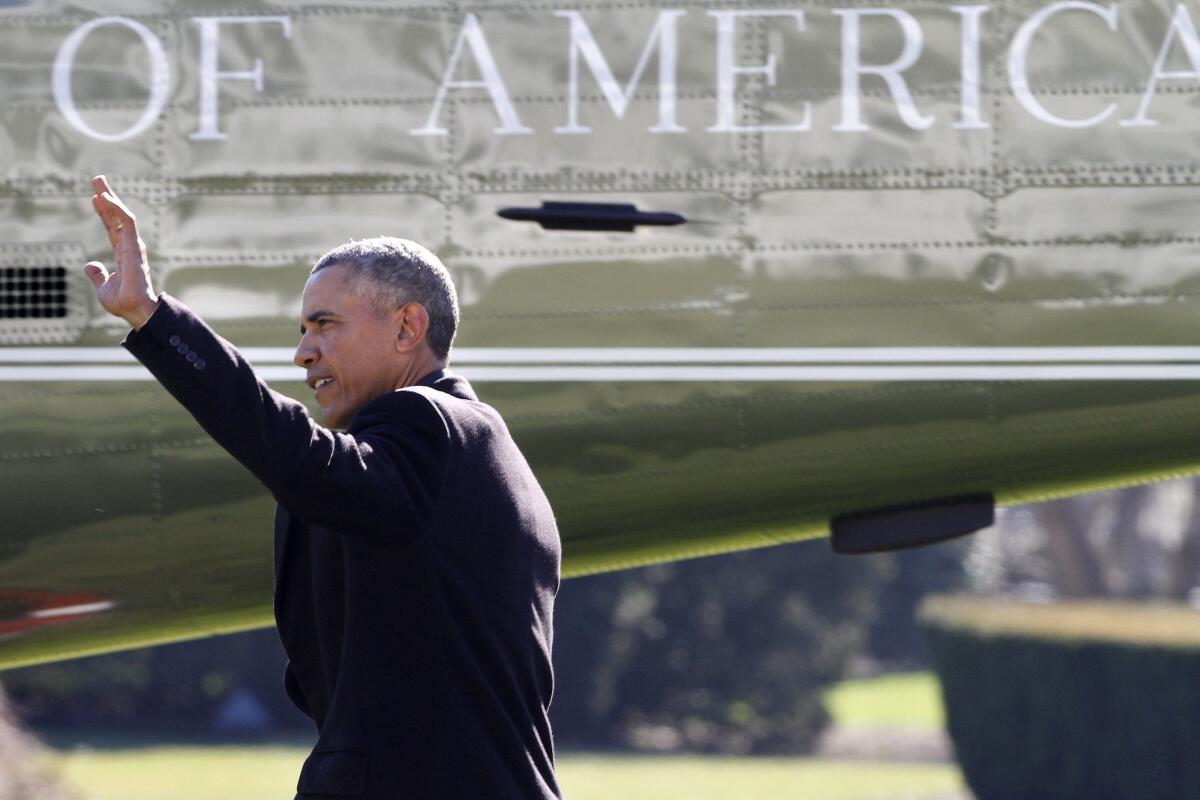Op-Ed: President Obama’s inability to integrate a divided America

President Barack Obama waves before boarding Marine One helicopter on the South Lawn of the White House on Jan. 13.
- Share via
Who was Obama, and how will he be remembered? Now that he’s on his way out — the Iowa caucuses being the official prelude to a new political era — the consensus that’s been building is that although Obama more than qualifies as successful, he has not been transformational. He has not fulfilled the early promise of change. That hoped-for change was not just political but also spiritual — it was supposed to finally forge One America across racial lines. But the racial lines have held. The clearest evidence of this is that from the beginning, Obama has always meant something different to black people than he does to everyone else.
Transformation requires something big and deep - it’s an embrace from a constituency beyond black folks, a constituency Obama didn’t, couldn’t fully win.
New York Times columnist Charles M. Blow recently said what’s been obvious to me for a long time: Obama’s legacy among black people, especially young people, will be immeasurable. Simply negotiating the space of the presidency for two terms, Blow wrote, will bolster blacks’ self-image for generations to come. But that is only part of the picture, and not the most important part. (The title of Blow’s column, “The Other Obama Legacy,” acknowledges as much.) Chiefly white opponents of the first black president view him as immeasurable in another way: an utter failure, an abomination or something worse.
Such acrimony is why Obama’s presidency has not been transformational. Transformation requires something big and deep — it’s an embrace from a constituency beyond black folks, a constituency Obama didn’t, couldn’t fully win. It’s a constituency that includes Congress.
Obama has always struck me as a lonely guy — a towering historical figure who at the same time was simply another black man trying to find his way in a hostile white environment. In this way he followed in the modern folk-hero tradition of Jackie Robinson and other gifted black “firsts” whose main task, besides playing baseball or being president, was to overcome overwhelming odds and gain acceptance in the face of racial adversity.
Much of what we call polarization in the Obama era is really just evidence of this old dynamic. These divisions extend to the very foundation of an American racial and social hierarchy that has endured for 400 years. The media consistently ignore it because they have been trained not to name race (or its corollary, racism) as a factor in anything. But how Obama is judged, what he will ultimately mean to the American people, depends less on his intrinsic qualities and his record than on which American people are doing the judging.
The gaze of white supremacy prevails. No matter how much Obama resonates with black folks — no matter how much he has transformed us — it is his resonance, or lack of it, among whites that is assumed to matter more. Black support is a given, the reasoning goes; white buy-in is the brass ring that will ultimately determine Obama’s importance. This is an example of the distinctly unequal nature of integration, and integration is really what Obama was trying to effect as president and before that, as a candidate with his One America campaign. But, Jackie Robinson notwithstanding, United States history is littered with failures of integration, and black people know those failures well. We’ve lived them.
With Obama, we braced ourselves for the resistance and the blowback that happens when any black person tries to assert his or her authority — or even competence — in a setting where few or no black people have asserted it before. We figured that a first of Obama’s magnitude was really going to catch hell, and we were right; a nasty battle that had been fought in schools and at lunch counters was suddenly being fought in the most rarefied public space of all, the White House.
The battle has been metaphorically bloody and mostly painful to watch. Obama’s policy victories, his sparkling turns in front of the camera and on social media, his manifest intelligence, his cool could never counterbalance the open and endless scorn of the tea party faction that has ruled the Republicans, and a good part of public opinion about Obama. This influential faction did not merely criticize Obama, it sought to humiliate him. It was personal.
Being black has to be understood as a collective experience, and for all the early talk about how black he was or wasn’t, Obama claimed his place in the tribe. That place is part of what has made him a folk hero to black folks; he is a first and a fellow traveler. He is us. Whether we liked him or not, Obama took on the job of representing and reflecting black folks’ ambitions, our strengths, our forbearance and, yes, our uncertainties and failures, which include over-compromising in order to make it in a white world that sees us as “less than.”
For eight years black Americans have followed Obama’s efforts closely, in a way white people couldn’t. We never believed he would be transformational. If Obama is remembered as a president who improved the nation’s numbers and broke the healthcare logjam, that will be triumph enough. The real mechanism of transformation is love, the ultimate solution for our racial crises advocated by Obama’s forebears Martin Luther King Jr. and James Baldwin. That kind of embrace will have to wait for another era.
Erin Aubry Kaplan is a contributing writer to Opinion. Her latest book, “I Heart Obama,” will be published this week.
Follow the Opinion section on Twitter @latimesopinion andFacebook
More to Read
A cure for the common opinion
Get thought-provoking perspectives with our weekly newsletter.
You may occasionally receive promotional content from the Los Angeles Times.










